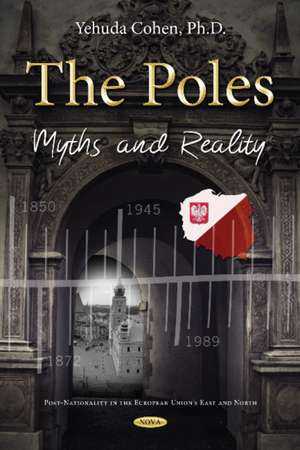Poles: Myths & Reality
Autor Yehuda Cohenen Limba Engleză Hardback – 31 oct 2017
Preț: 1444.75 lei
Preț vechi: 1853.45 lei
-22% Nou
Puncte Express: 2167
Preț estimativ în valută:
276.49€ • 287.59$ • 228.26£
276.49€ • 287.59$ • 228.26£
Carte disponibilă
Livrare economică 25 martie-08 aprilie
Preluare comenzi: 021 569.72.76
Specificații
ISBN-13: 9781536125627
ISBN-10: 1536125628
Pagini: 365
Dimensiuni: 262 x 184 x 25 mm
Greutate: 0.78 kg
Editura: Nova Science Publishers Inc
Colecția Nova Science Publishers Inc
ISBN-10: 1536125628
Pagini: 365
Dimensiuni: 262 x 184 x 25 mm
Greutate: 0.78 kg
Editura: Nova Science Publishers Inc
Colecția Nova Science Publishers Inc
Cuprins
Preface; Introduction; The Pre-State Era; Poland's Origin; The Early Years of Existence of the Polish State; The Age of Maturity: the Polish Kingdom; A Hundred Years of Economic Growth & Social Change; The Polish Crown at the Height of Power During the Fourteenth & Fifteenth Centuries; The Polish Golden Age Era (1492-1586); The Polish Community at a Turning Point (1586-1648); The Polish Communities During the Crisis Years (1648-1696); The Crisis of Sovereignty (1697-1763); Provisional Reforms Under the Russian Auspices (1763-1788); Society & Culture in Poland During the Age of Enlightenment; The Struggle for Independence & Reform of a Kingdom United (1788-1794); The Napoleonic Period (1795-1815); The Polish Kingdom & the November Uprising (1815-1831); On the Eve of the Agrarian Revolution (1832-1849); An Age of Uprising (1850-1864); Positivism & Triple Loyalty: An Initiation of the Proletariat Movement (1864-1885); The Formation of the Mass Political Parties: Nationality & Socialism (1885-1904); The Age of Revolution & the Approaching of a European War (1904-1914); World War I & the Reconstruction of the Polish State (1914-1918); Defining the Borders & Drafting a Constitution (1918-1921); The Parliamentary Government (1922-1926); Prosperity & Crisis: the Struggle for the Legalization of the Pilsudski Dictatorship; World War II; The Communist Party: The Poles Standing Up to the Soviets; The Developments in Poland During 1946-1980; Poland Departing the Soviet Bloc's Framework; The Third Republic; The Polish & Catholic Culture: Are These a Nationality's Foundations?; The Poles' Approach Toward Europe, Nato & the EU; Summary; Alphabetical References; References; Index.
